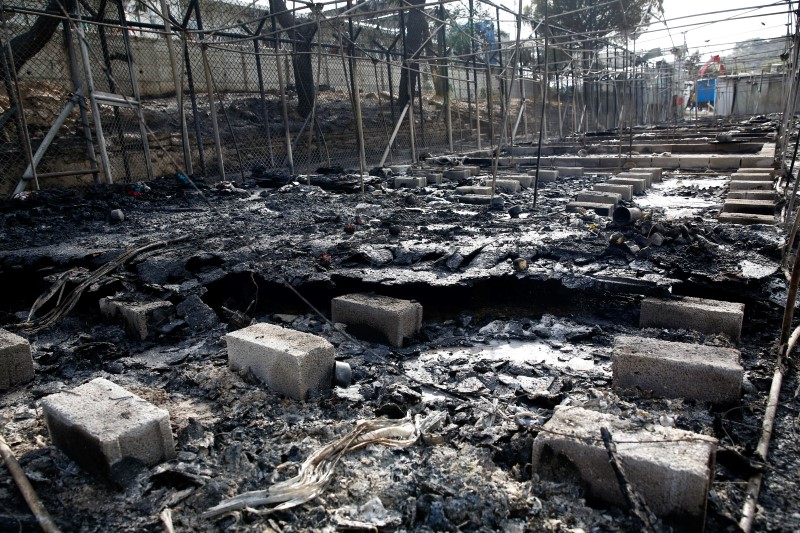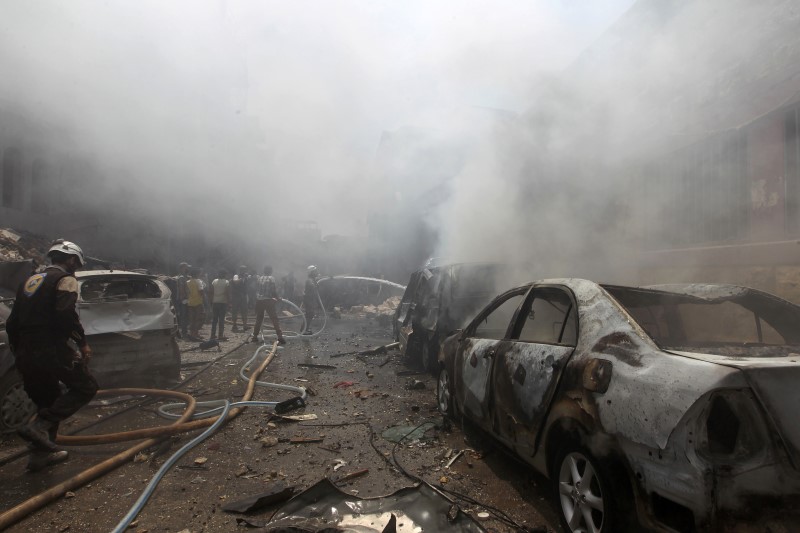
By Orhan Coskun and Ercan Gurses
ANKARA (Reuters) – Turkey will have to strike a balance between the conflicting goals of Russia and the United States if it is to achieve its ambition of a “safe zone” in northern Syria and build on an incursion which gave it control of a thin strip of the border.
Turkey has for several years called for world powers to help create a zone to protect civilians in its war-torn southern neighbor, with the dual aim of clearing its border of Islamic State and Kurdish militia fighters and of stemming a wave of migration that has caused tensions with Europe.
Western allies have so far balked at the idea, saying it would require a significant ground force and planes to patrol a “no-fly zone”, a major commitment in such a crowded and messy battlefield. Russia, which backs Syrian President Bashar al-Assad, has meanwhile argued in the past that any foreign incursion would be illegal.
But Turkey’s offensive into northern Syria, launched with its Syrian rebel allies two weeks ago, has created what officials in Ankara are already calling a “de facto safe zone”, driving Islamic State militants from the last 90-km (55-mile) strip of border territory they still controlled.
Turkey now wants international support for a deeper operation to take control of a rectangle of territory stretching about 40 km into Syria, a buffer between two Kurdish-held cantons to the east and west and against Islamic State to the south.
“The first phase of the plan has been achieved. Turkey no longer has borders with Islamic State. But this area is still very thin and vulnerable to attacks from the other side,” said a senior Turkish official, speaking on condition of anonymity so as to discuss the strategy more freely.
“What will be done now will depend on coordination with coalition powers and the support they will provide,” he said, adding an improvement in relations with Russia had “eased Turkey’s hand” operationally.
The Turkish-backed rebels, mainly Syrian Arabs and Turkmen fighting under the banner of the Free Syrian Army, took charge of the frontier between the towns of Azaz and Jarablus on Sunday after seizing 20 villages from the ultra-hardline Islamists.
Ahmed Osman, commander of the Sultan Murad rebel group, one of the Turkish-backed forces, told Reuters he would like to see a permanent “safe zone” but that this would require an agreement between Turkey, the United States and Russia.
CONFLICTING INTERESTS
Turkish President Tayyip Erdogan, his hand strengthened by Turkey’s incursion, said on Monday he had raised the issue of a “safe zone” again with both Russian President Vladimir Putin and U.S. President Barack Obama at the G20 summit in China.
Neither commented directly on the Turkish proposal, though both said they wanted to build cooperation in fighting terrorism in Syria. Erdogan’s spokesman said there were neither objections nor clear signs of support in the meetings.
A second senior Turkish official acknowledged both Washington and Russia “had their hesitations” but that a “de facto safe zone” had now become a reality on the ground and that their support, particularly in establishing a no-fly zone, was crucial.
Metin Gurcan, a former major in the Turkish military and an analyst for the Al Monitor online journal, said Washington and Moscow’s divergent agendas in Syria raised serious questions about the viability of the Turkish plans.
“We are talking about two superpowers with great stakes in Syria. They have contradicting strategic interests about the end goal in Syria,” he said.
More than five years of civil war have cut Syria into a patchwork of territories held by the government and an often competing array of armed factions, including Kurdish militia fighters, a loose coalition of rebels groups, and Islamic State.
The priority for Washington, which backs rebel factions fighting Assad in the civil war, is destroying Islamic State and it has been at odds with Turkey over the role of the Syrian Kurdish YPG militia. The United States has backed the Kurdish fighters against the jihadists, but Turkey sees them as a hostile force linked to Kurdish militants on its own soil.
The two NATO allies have reached an uneasy agreement under which YPG fighters are meant to remain east of the Euphrates river, just outside Turkey’s proposed buffer zone, although Ankara has said it has yet to verify that they are doing so.
Turkey meanwhile appears to be navigating Russian concerns more smoothly since restoring relations with Moscow in August, nine months after ties were broken when it shot down a Russian fighter jet near the Syrian border.
Erdogan’s spokesman said on Tuesday that Russia had voiced full support for Turkey’s operation to clear the border of Islamic State. For its part, Turkey has been less insistent on Assad’s immediate exit.
“They appear to be lessening their demands for the ouster of Assad in deference to their new relationship with Russia,” said James Stavridis, former NATO supreme commander and dean at the Fletcher School of Law and Diplomacy at Tufts University.
‘ARMAGEDDON’
Aside from the diplomatic challenges, a push deeper into Syria by the Turkish-backed Arab and Turkmen rebels poses significant military risks.
The Turkish-backed forces have been advancing toward Manbij, a city around 30 km south of Jarablus that was captured last month from Islamic State by a U.S.-backed coalition that includes the YPG. The Kurdish fighters are since supposed to have pulled back east of the Euphrates.
“We know there are de facto YPG factions still there. If they don’t retreat, Turkey will be determined and return Manbij to its owners,” said Yasin Aktay, a spokesman for Turkey’s ruling AK Party, referring to Arab and Turkmen communities who lived there before civil war broke out in 2011.
The Islamic State-held town of Al-Bab, west of Manbij, is another a key strategic target for both Turkish-backed and Kurdish forces where Abu Muhammad al-Adnani, one of Islamic State’s most prominent leaders, is thought to have been killed in a U.S. air strike last week.
To its northwest is the village of Dabiq – the site, according to Islamic prophecy, of a final battle between Muslims and infidels, an event in Islamic State propaganda that will herald the apocalypse.
“The fight for the Turkish-backed rebels is going to get tougher as they proceed south,” said a former Turkish soldier and security analyst Abdullah Agar. “According to Islamic State’s beliefs, they will face Armageddon here.”
(Additional reporting by Tom Perry in Beirut, Tulay Karadeniz in Ankara and Humeyra Pamuk, Edmund Blair and Akin Aytekin in Istanbul; Writing by Nick Tattersall; Editing by Pravin Char)











